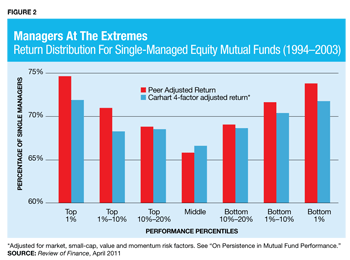Gundlach's track record was impressive, right up to the point that he was "relieved of his duties," so the departure didn't appear to be about wilting performance. TCW confirmed as much when it complained that its star manager had plans to leave, and so abruptly terminated him. The company's explanation was that Gundlach was cut loose because it was looking at "strategic alternatives," including a sale to a private equity firm. Gundlach had a different perspective, and the entire matter ended up in court. In the meantime, he quickly launched a new firm, DoubleLine, along with several TCW colleagues, and was running a new fund by spring 2010.
The challenge for investors in the interim was to determine whether Gundlach's departure had dealt TCW's fund a debilitating blow or only posed a bump in the road. The stakes were high, considering that Gundlach had become a darling in the world of bond funds by virtue of his remarkable track record. TCW partly blunted the impact when it purchased Metropolitan West (a deal it announced at the time of his firing) and shifted management responsibilities for most of the TCW Total Return Bond fund's assets to Tad Rivelle, who was also a celebrated fixed-income manager. Ironically, there were persistent reports that the team that TCW brought in from Metropolitan West has been negotiating its own buyout from parent Societe Generale, this time with TCW's participation. The rumors proved accurate in early August, when TCW was sold to the Carlyle Group.

A bit more than a week after Gundlach was cut loose, Morningstar advised "sitting tight" with Rivelle. The counsel fell on many investors' deaf ears and the TCW fund lost a substantial chunk of its assets. The portfolio subsequently bounced back and has since delivered respectable results. But critics note that the DoubleLine Total Return fund's performance in the first full year of its existence, 9.6% according to Morningstar Principia, outdistanced the TCW fund's 6.1% through April 2012. TCW has not quieted these critics by continuing to tout the long-term performance of its fund when Gundlach ran the portfolio.
Was Gundlach's triumphant second act preordained? No, though his track record hinted that there was more than luck in his record. Tipping the scales in his favor was the large portion of his TCW research and trading team that followed him to DoubleLine. Predicting success (or failure) in active management may be a fool's errand generally, but if you were impressed by Gundlach at TCW, it was fair to expect that his team could deliver comparable results once they'd moved on.
Back To The Fundamentals
Everything is obvious in hindsight, of course. Developing confidence in real time is something else. The arrival of a new manager may be a blessing or a curse, and figuring out which requires some digging. Your analysis may be relatively easy if a big name takes over a fund. By contrast, you'll have your work cut out for you if you're unfamiliar with the new boss. Financial regulations don't make your task any easier-a fund manager's previous record, if there is one, is off limits for publication by a fund company.
You can (and should) investigate the new kid on the block, and that starts with the paper trail, assuming you can find it. But evaluating the impact of a manager change goes beyond looking in the rearview mirror. There's no substitute for qualitative research, says Jack Chee, a senior research analyst at Litman Gregory Asset Management, an investment advisory firm in Larkspur, Calif.
"We want to understand why the manager left. Answering that question could speak to his motivation," Chee says. "On the positive side, the manager could feel that he was getting stretched too thin and asked to run too many products. On the negative side, it could be a purely financial motivation and he wants more of the star mentality."
On the topic of where a manager's going (if he's headed to a new or existing fund), there are basic questions to resolve, Chee continues. "Is his or her team going to follow them? Why or why not? Will there be issues at the new firm that will prevent the manager from focusing on investing? Will they have sufficient assets so that we don't have to worry about the viability of the firm?" A gifted money manager walks out of the door every night with all his intellectual assets. But does he have sufficient resources-compliance, research, trading, marketing departments-to replicate the former glory?
It can take time to answer these questions, Chee notes. "You have to understand the success of a fund in the first place." He recalls that researchers at his firm last year spent a total of nearly 40 hours in conversations with the BBH Core Select fund's management before investing.
Manager changes are a big deal for some advisors, but Rick Rodgers, the founder of Rodgers & Associates in Lancaster, Pa., prefers to let the fund's numbers do most of the talking. Funds that trail their peer groups are eventually given the boot.
A manager change may or may not push a fund off his buy list, but a personnel adjustment alone isn't a reason to flee, he says. "Who's to say that all the changes won't be fabulous?" Rogers muses. "There's no way to know that in advance. We'll only get rid of it if it meets our sell criteria."
Change Can Be Good (Sometimes)
Actually, there's some evidence that struggling funds can improve when a new manager takes over. In September 2001, Ajay Khorana wrote in the Journal of Financial and Quantitative Analysis that dismissing poorly performing managers could lead to substantial improvements in a fund's performance.








